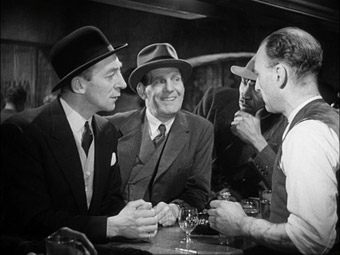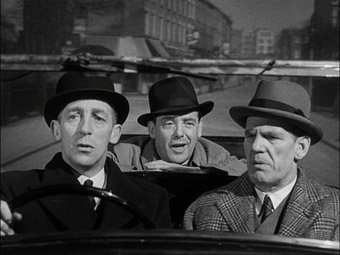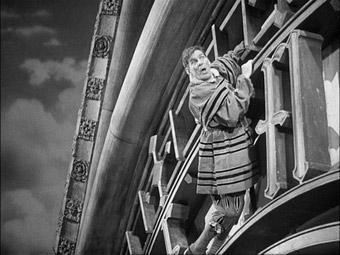|
I've never really connected with the comedy of British music hall era (that's vaudeville to American readers) and 1930s radio. It is, I have little doubt, a generational thing, shaped in part by what makes us laugh in our youth and the evolving nature of comedy. The exception to this has always been the work of Will Hay, and I've never been able to pinpoint exactly why. He was, after all, as given to piercingly excitable shouts as Arthur Askey or Norman Wisdom, and as Eric Morecambe observed in his forward to Roy Seaton and Roy Martin's biography of Hay, Good Morning Boys, he's not a particularly funny man per se. But he had a knack of surrounding himself with funny people, had a real gift for comic timing, and a sharp eye for the absurd aspects of human behaviour. The comic bantering and action of his films could build to a dizzying but controlled frenzy, a technique that peaked in 1937 with the sublime Oh, Mr Porter!.
Having worked to a successful formula for several years, in the 1940s Hay parted company with favourite sidekicks Graham Moffatt and Moore Marriott and began working with a variety of alternative co-stars – including a young John Mills – though did hang on to the befuddled schoolmaster character with which he had made his name. But in 1943 he embarked on a more distinct direction change with My Learned Friend, a smart and slickly produced black comedy that prefigured Ealing's later and more widely celebrated Kind Hearts and Coronets. It marked a shift in style that Hay expressed interest in exploring further in subsequent films. Little did he know at the time that this was to be his last.

Hay here plays disbarred lawyer William Fitch, whom we first encounter when he's hauled into court accused of sending a series of blatantly deceptive begging letters. Charged with the job of prosecuting Fitch, mainly because the firm he works for wouldn't trust him with anything serious, is daffy nitwit Claude Babbington (Claude Hulbert), who completely fumbles the case when Fitch runs debating rings around this inexperienced junior. The pair meet up in the pub afterwards, and Fitch proposes a partnership based on his brains and Babbington's money, but no sooner has the deal been tentatively agreed on than up pops Arthur Grimshaw (Mervyn Johns), a client Fitch unsuccessfully defended and who is now free and planning to take revenge on those who put him in jail. He's drawn up a list of six that he intends to deal with in turn, and is saving Fitch until last. At the top is the judge who passed sentence and he's already dead – can Fitch foil Grimshaw's plans and save his own skin?
Right from the start we're in new territory for Hay, who easily bests his opponent with some rather nifty language game-playing instead of being left confused and flustered by others. No longer is he the well-meaning buffoon of earlier films, but a confident grifter with an inflated view of his own abilities, a man you really could believe really was once a lawyer, a job that's clearly only landed in Babbington's lap through daddy's connections. Those who mourned the absence of Moffatt and Marriott in Hay's later films will find plenty to cheer for here, as Hulbert proves a fine partner for the new direction Hay, a professional silly-ass whose best comic moments – the gawky dance he is roped into in a basement pub – have weathered the passing of time rather well.
The film foreshadows Kind Hearts and Coronets not just in its black comedy and colourful killings, but in the ingenuity of its plotting and wordplay, the work of Hay regulars John Dighton and Angus MacPhail (the pair also wrote the superb Went the Day Well?, while Dighton was to later collaborate with Robert Hamer on – wouldn't you know it – Kind Hearts and Coronets). The increasingly batty Grimshaw delights in providing imaginative clues to who the next victim will be and where they'll be offed, and then involving the unknowing Fitch and Babbington in the killings, whether it be to start a fight in a pub to provide cover for the murder or to lead a psychiatrist (one of whose patients is played by the lovely Ernest Thesiger) into a particularly nasty trap, albeit one he would probably have fallen into without their intervention.

While some elements have inevitably dated – mental illness is played exclusively, if inventively, for laughs – others play like they've popped back in time from a later film. This is particularly evident in the two black customers in the basement pub who casually intimidate Fitch and Babbington and cheerfully steal the latter's hat and brolly – they may be presented as criminal opportunists, but no more so than any of the pub's other customers (it is something of a criminal hideout, after all) and are clearly treated as equals by staff and patrons alike, a very rare sight in a film made in 1943. It's a similar story with criminal landlord 'Safety' Wilson, so named for his fondness for taking a razor to his victims, a pastime grimly hinted at when he calmly embeds a razor blade into a rubber cosh as he prepares to teach Fitch an unpleasant lesson. Even the climax was to leave its mark on later British cinema – Fitch and Babbington scrabbling across the face of Ben Ben and hanging onto the clock hands in an attempt to prevent a triggered explosion may have been inspired by Harold Lloyd, but the scene was lifted almost wholesale by Don Sharp for his 1978 remake of The Thirty-Nine Steps.
Consistently smart and inventive, tightly co-directed by Basil Dearden and Hay himself, and trotting through its 71-minute running time with hardly a pause for breath, My Learned Friend is not just one of Hay's finest films, but one of the key British comedy works of the 1940s, and one that deserves to be recognised more widely for the achievement it is. In retrospect, it seems all the more tragic that the star was not able to follow through on this new comic direction as planned, leaving us to wonder just what other gems he might have produced in the years that followed, had a series of strokes not so tragically ended his career.
Another very fine Studio Canal restoration from Optimum, the picture here really does belie the film's age, boasting an impressive level of sharpness, nicely graded contrast, and excellent black levels without major loss of shadow detail. The print has also been very nicely cleaned up and there's no evidence of serious damage or frame jitter.

The mono soundtrack does show its age a little in the restricted tonal range and occasionally tinny voice reproduction, but for the most part it's as clear as you could hope for. Background fluff and crackle are evident, but only just.
None.
A splendid cinematic swan song for Will Hay and a first rate example of early British black comedy at its most polished. It's a welcome release that has been impressively restored, and as such comes warmly recommended.
|